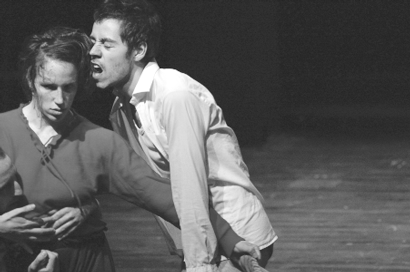Yasmeen Godder’s Bloody Bench Players
“Yasmeen Godder and the Bloody Bench Players Present Strawberry Cream and Gunpowder” is the full title of the choreographer’s piece created in 2004, which premiered at the Lincoln Center Festival July 27. It was performed at the LaGuardia Drama Theater—a comfortably proportioned black box with steep stadium seating and great sightlines.
Godder’s charmingly edgy title refers to taking the good with the bad. “You order something and you get something else,” she said in the post-symposium. But of the three Israeli imports in the Festival, this dance-theater piece directly addresses the ongoing conflict that reaches the world in daily grisly newspaper photos. The piece is complete with the smell of gun smoke, leaving few blanks to fill in.
Working from media images she collected of the suffering, Godder and her six players interpret with a very specific and literal movement vocabulary. Arkadi Zaides plays dead, Maya Weinberg is a mourning, incredulous onlooker. In pugilistic play with pistol-shaped hands, victims morph into aggressors. A flirtatious duet turns into a stick-up. Moving tableaux of solos, duets, trios, or small groupings are composed like pictures cropped for action—the kind so difficult to look at yet seen with such frequency we are inured.
But we feel the human toll when Zaides lies on his back near center stage about midway through the dance in his black briefs looking frighteningly vulnerable, while Eran Shanny reels berserk in a trigger-happy dance. He waves his arm overhead with two fingers pointed like a fattened muzzle.
In this sub-theme of cowboy braggadocio the women swagger or ride on the backs of bucking broncos—dancers on all fours. Jeremy Bernheim removes and flashes his carrot-colored shirt like a toreador and Godder is the bull. Bernheim taunts a chorus of dancers who are on all fours and salivating. Their heads are down while walking on all fours together, like slavish horses with a certain dignity.
Avi Belleli’s pensive Western-style whistling and strumming—he’s playing a double neck slide guitar on stage—augments this aura of wild frontier. The women wail, blurting out a single singsong note or croon pop lyrics like “all your love.” A low-tech apparatus in the performing area creates a whooshing sound and Belleli uses other customized instruments and electronics to achieve a background soundscape of rocket or Uzi fire. The sound and lighting by Jackie Shemesh are on the mark; they memorably support the danced images and never steal the show or undermine our view.
Godder’s readymade subject leaves no need to further deconstruct or offend. Watching Zaides’s dead weight or Iris Erez’s cool and limber length, her pelvis moving forward and back and her hands waving above, or Weinberg crouched forever in an uncomfortable plié—gives satisfying substance to the disturbing subject, which is rendered not just palatable but beautiful. Inbar Nemirovsky completes the cast.
Gal Weinstein’s set is like an artificial toy village with wood-grain vinyl runners that are rumpled at the ends and a small piney clump in the center. The mound of green soon gets trampled. A fresh looking tollgate raises and lowers. As dancers are cast out into the darkness they sit looking in. The bedlam inside is far from enviable. To both insider and outsider, things look out of control. Godder and her Bloody Bench Players’ messy scenes are wet with sweat and soggy torrential tears over the rampage, the implied carnage.
Godder spoke to the audience afterward of the difficulty in facing the images and bringing them to life. It’s equally challenging to look at the dance. With an Arabic head covering here, a flash of toreador’s cape, a cowboy’s swagger—Godder creates a universal mirror. Her ending is an elegant and hopeful release. Even if Zaides only sits up very erect and looks after Weinberg as she’s walking tall toward an upstage corner, its romance, its naturalism speaks of the ever after.
gaycitynews.com


































